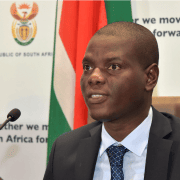|
Getting your Trinity Audio player ready...
|
South Africa should tread cautiously on its approach towards whistle-blower incentivisation, take lessons from both the countries that have made it a success and the ones that have failed, and develop its own formula for the process. This is the mixed bag of proposals shared at a recent webinar on the subject, hosted by the Public Affairs Research Institute (Pari).
ENS Africa forensics specialist Steven Powell is for incentivisation of whistle-blowers, a method of encouraging whistle-blowing which finds favour in the OECD’s recommendation for the protection of whistle-blowers. Several countries that have enacted incentivisation schemes, such as the US which has been at it since as early as the 1800s, have made a success of it, based on figures that that government regularly shares. So popular is the trend that it is even encouraged through advertising, but also has also created a market for law firms that specialise in the representation of whistle-blowers.
South Africa’s situation in comparison, Powell added, was a far cry from where US whistle-blowers are: emboldened by a support structure of law enforcement to do good.
“At the moment, our country provides limited protection with horrible consequences to many whistle-blowers, and we need to reverse that trend,” he noted. “And when we look at the numbers that the US government makes through its civil fraud programme, we’re talking about billions of US dollars that is recovered from companies on the wrong side of enforcement action and you can see whistle-blowers have been rewarded extensively in the US.”
Fellow panellist, Stellenbosch University’s Sope Williams-Elegbe, raised a note of caution for South Africa, though. She described the environment for whistle-blower incentivisation in the both the US and the UK as having evolved over the years, growing into what it is today because it is supported by an active, present law enforcement framework.
“The US whistle-blower schemes have a lot of success because of the whole structure around these schemes, so the benefits are there and it works in certain jurisdictions.” However, she cautioned South Africa to proceed with care, given the differences between the country and the US and UK.
“First, in terms of the functioning and the responsiveness of our legal system and our law enforcement, there is a big difference. We have a different police-to-citizen ratio than other countries do. So people going to law enforcement with white collar crimes… we’ve seen from state capture and what has happened over the last decade, our systems are not functioning the way they ought to.”
In terms of corruption cases, she added, numerous cases have been thrown out because the prosecutors didn’t have the evidence, or the cases were not watertight.
“In the US there is a lot of institutional support for whistle-blowers generally, so every public department or organ of state has an office of an inspector-general to which you can report these protected disclosures. They investigate and then send these off to law enforcement.”
Incentivisation not an answer to security concerns
Adding an incentivisation mechanism to the South African framework of whistle-blower protection will not address the country’s most urgent challenge, the physical security aspect associated with whistleblowing, said Williams-Elegbe.
“Incentivising whistle-blowers cannot deal with the biggest issue which we have in South Africa, which is the risk to life. There is no scheme that can prevent … the criminal enterprises from taking you out. I haven’t seen evidence from other jurisdictions that whistle-blowers are routinely killed.”
African countries that have had these incentivisation schemes have had to terminate them, she added. “Zimbabwe had an incentivisation scheme in terms of tax revenues, so if you blew the whistle on people who owed the tax revenue then you would get … 10 to 30% of whatever would be recovered. But they found after a while that tax officials were colluding with tax agents to blow the whistle.”
Her suggestion is that South Africa look at countries that have a framework comparative to ours, and learn lessons from how they failed in whistle-blower incentivisation, as opposed to looking to countries with which we have a different legal, economic, and social history.
A more nuanced approach needed in SA
But as things stand in South Africa, we are taking a flawed approach in the way we debate the topic, said Pari’s Ryan Brunette.
“The discussion hinges on the question of whether or not to introduce incentivised whistle-blowing. The options are often presented as all or nothing – either we incentivise all whistle-blowing or we don’t incentivise any whistle-blowing. Such an all-encompassing conception can only bias us towards … inaction.”
In any case, the South African government already incentivises whistle-blowing in the environmental conservation environment, he argued. The question is not whether we have incentivisation, but where else it could be used, and what clauses to include in the whistle-blower incentivisation mechanism, and how to design that mechanism.
One of the arguments against incentivisation is that it may be abused by those who know how to circumvent the system.
“That can be addressed by how we design the mechanism, and it needn’t stop us from developing it as we go. The appropriate response is to start the experiment at a small scale, to adapt the mechanism as we go. If it works, we can start to scale up, and if it doesn’t people withdraw.”
In other words, the South African state could start by tailoring incentivised whistle-blowing narrowly and taking it from there.







